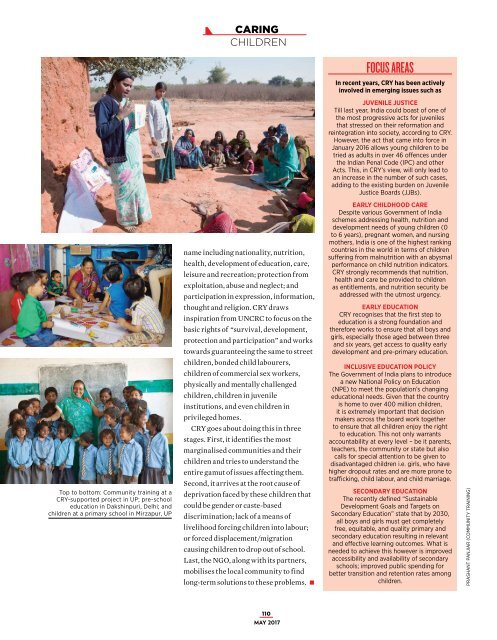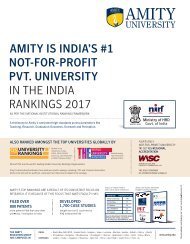Spice May issue ipad LR
Create successful ePaper yourself
Turn your PDF publications into a flip-book with our unique Google optimized e-Paper software.
CARING<br />
CHILDREN<br />
FOCUS AREAS<br />
In recent years, CRY has been actively<br />
involved in emerging <strong>issue</strong>s such as<br />
JUVENILE JUSTICE<br />
Till last year, India could boast of one of<br />
the most progressive acts for juveniles<br />
that stressed on their reformation and<br />
reintegration into society, according to CRY.<br />
However, the act that came into force in<br />
January 2016 allows young children to be<br />
tried as adults in over 46 offences under<br />
the Indian Penal Code (IPC) and other<br />
Acts. This, in CRY’s view, will only lead to<br />
an increase in the number of such cases,<br />
adding to the existing burden on Juvenile<br />
Justice Boards (JJBs).<br />
name including nationality, nutrition,<br />
health, development of education, care,<br />
leisure and recreation; protection from<br />
exploitation, abuse and neglect; and<br />
participation in expression, information,<br />
thought and religion. CRY draws<br />
inspiration from UNCRC to focus on the<br />
basic rights of “survival, development,<br />
protection and participation” and works<br />
towards guaranteeing the same to street<br />
children, bonded child labourers,<br />
children of commercial sex workers,<br />
physically and mentally challenged<br />
children, children in juvenile<br />
institutions, and even children in<br />
privileged homes.<br />
CRY goes about doing this in three<br />
stages. First, it identifies the most<br />
marginalised communities and their<br />
children and tries to understand the<br />
entire gamut of <strong>issue</strong>s affecting them.<br />
Second, it arrives at the root cause of<br />
deprivation faced by these children that<br />
could be gender or caste-based<br />
discrimination; lack of a means of<br />
livelihood forcing children into labour;<br />
or forced displacement/migration<br />
causing children to drop out of school.<br />
Last, the NGO, along with its partners,<br />
mobilises the local community to find<br />
long-term solutions to these problems.<br />
EARLY CHILDHOOD CARE<br />
Despite various Government of India<br />
schemes addressing health, nutrition and<br />
development needs of young children (0<br />
to 6 years), pregnant women, and nursing<br />
mothers, India is one of the highest ranking<br />
countries in the world in terms of children<br />
suffering from malnutrition with an abysmal<br />
performance on child nutrition indicators.<br />
CRY strongly recommends that nutrition,<br />
health and care be provided to children<br />
as entitlements, and nutrition security be<br />
addressed with the utmost urgency.<br />
EARLY EDUCATION<br />
CRY recognises that the first step to<br />
education is a strong foundation and<br />
therefore works to ensure that all boys and<br />
girls, especially those aged between three<br />
and six years, get access to quality early<br />
development and pre-primary education.<br />
Top to bottom: Community training at a<br />
CRY-supported project in UP; pre-school<br />
education in Dakshinpuri, Delhi; and<br />
children at a primary school in Mirzapur, UP<br />
INCLUSIVE EDUCATION POLICY<br />
The Government of India plans to introduce<br />
a new National Policy on Education<br />
(NPE) to meet the population’s changing<br />
educational needs. Given that the country<br />
is home to over 400 million children,<br />
it is extremely important that decision<br />
makers across the board work together<br />
to ensure that all children enjoy the right<br />
to education. This not only warrants<br />
accountability at every level – be it parents,<br />
teachers, the community or state but also<br />
calls for special attention to be given to<br />
disadvantaged children i.e. girls, who have<br />
higher dropout rates and are more prone to<br />
trafficking, child labour, and child marriage.<br />
SECONDARY EDUCATION<br />
The recently defined “Sustainable<br />
Development Goals and Targets on<br />
Secondary Education” state that by 2030,<br />
all boys and girls must get completely<br />
free, equitable, and quality primary and<br />
secondary education resulting in relevant<br />
and effective learning outcomes. What is<br />
needed to achieve this however is improved<br />
accessibility and availability of secondary<br />
schools; improved public spending for<br />
better transition and retention rates among<br />
children.<br />
PRASHANT PANJIAR (COMMUNITY TRAINING)<br />
110<br />
MAY 2017

















